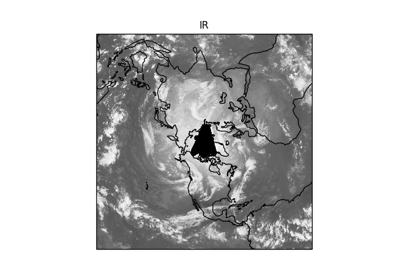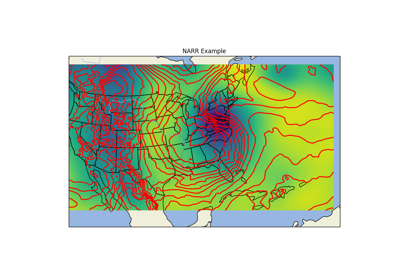MapPanel¶
-
class
metpy.plots.MapPanel(*args, **kwargs)[source]¶ Set figure related elements for an individual panel.
Parameters that need to be set include collecting all plotting types (e.g., contours, wind barbs, etc.) that are desired to be in a given panel. Additionally, traits can be set to plot map related features (e.g., coastlines, borders), projection, graphics area, and title.
Attributes Summary
A tuple or string value that indicates the graphical area of the plot.
Get the
matplotlib.axes.Axesto draw on.A contextmanager for running a block with our cross validation lock set to True.
A string for a pre-defined feature layer or a Cartopy Feature object.
A tuple that contains the description (nrows, ncols, index) of the panel position; default value is (1, 1, 1).
A trait whose value must be an instance of a specified class.
A list of handles that represent the plots (e.g.,
ContourPlot,FilledContourPlot,ImagePlot) to put on a given panel.A string for a pre-defined projection or a Cartopy projection object.
A string to set a title for the figure.
Methods Summary
__init__(*args, **kwargs)Initialize self.
add_traits(**traits)Dynamically add trait attributes to the HasTraits instance.
class_own_trait_events(name)Get a dict of all event handlers defined on this class, not a parent.
class_own_traits(**metadata)Get a dict of all the traitlets defined on this class, not a parent.
class_trait_names(**metadata)Get a list of all the names of this class’ traits.
class_traits(**metadata)Get a
dictof all the traits of this class.draw()Draw the panel.
has_trait(name)Returns True if the object has a trait with the specified name.
Context manager for bundling trait change notifications and cross validation.
notify_change(change)observe(handler[, names, type])Setup a handler to be called when a trait changes.
on_trait_change([handler, name, remove])DEPRECATED: Setup a handler to be called when a trait changes.
refresh(changed)Refresh the drawing if necessary.
set_trait(name, value)Forcibly sets trait attribute, including read-only attributes.
setup_instance(*args, **kwargs)This is called before self.__init__ is called.
trait_events([name])Get a
dictof all the event handlers of this class.trait_metadata(traitname, key[, default])Get metadata values for trait by key.
trait_names(**metadata)Get a list of all the names of this class’ traits.
traits(**metadata)Get a
dictof all the traits of this class.unobserve(handler[, names, type])Remove a trait change handler.
unobserve_all([name])Remove trait change handlers of any type for the specified name.
Attributes Documentation
-
area¶ A tuple or string value that indicates the graphical area of the plot.
The tuple value coresponds to longitude/latitude box based on the projection of the map with the format (west-most longitude, east-most longitude, south-most latitude, north-most latitude). This tuple defines a box from the lower-left to the upper-right corner.
This trait can also be set with a string value associated with the named geographic regions within MetPy. The tuples associated with the names are based on a PlatteCarree projection. For a CONUS region, the following strings can be used: ‘us’, ‘spcus’, ‘ncus’, and ‘afus’. For regional plots, US state postal codes can be used.
-
ax¶ Get the
matplotlib.axes.Axesto draw on.Creates a new instance if necessary.
-
cross_validation_lock¶ A contextmanager for running a block with our cross validation lock set to True.
At the end of the block, the lock’s value is restored to its value prior to entering the block.
-
layers¶ A string for a pre-defined feature layer or a Cartopy Feature object.
Like the projection, there are a couple of pre-defined feature layers that can be called using a short name. The pre-defined layers are: ‘coastline’, ‘states’, ‘borders’, ‘lakes’, ‘land’, ‘ocean’, and ‘rivers’. Additionally, this trait can be set using a Cartopy Feature object.
-
layout¶ A tuple that contains the description (nrows, ncols, index) of the panel position; default value is (1, 1, 1).
This trait is set to describe the panel position and the default is for a single panel. For example, a four-panel plot will have two rows and two columns with the tuple setting for the upper-left panel as (2, 2, 1), upper-right as (2, 2, 2), lower-left as (2, 2, 3), and lower-right as (2, 2, 4). For more details see the documentation for
matplotlib.figure.Figure.add_subplot.
-
parent¶ A trait whose value must be an instance of a specified class.
The value can also be an instance of a subclass of the specified class.
Subclasses can declare default classes by overriding the klass attribute
-
plots¶ A list of handles that represent the plots (e.g.,
ContourPlot,FilledContourPlot,ImagePlot) to put on a given panel.This trait collects the different plots, including contours and images, that are intended for a given panel.
-
projection¶ A string for a pre-defined projection or a Cartopy projection object.
There are three pre-defined projections that can be called with a short name: Lambert conformal conic (‘lcc’), Mercator (‘mer’), or polar-stereographic (‘ps’). Additionally, this trait can be set to a Cartopy projection object.
-
title¶ A string to set a title for the figure.
This trait sets a user-defined title that will plot at the top center of the figure.
Methods Documentation
-
__init__(*args, **kwargs)¶ Initialize self. See help(type(self)) for accurate signature.
-
add_traits(**traits)¶ Dynamically add trait attributes to the HasTraits instance.
-
classmethod
class_own_trait_events(name)¶ Get a dict of all event handlers defined on this class, not a parent.
Works like
event_handlers, except for excluding traits from parents.
-
classmethod
class_own_traits(**metadata)¶ Get a dict of all the traitlets defined on this class, not a parent.
Works like
class_traits, except for excluding traits from parents.
-
classmethod
class_trait_names(**metadata)¶ Get a list of all the names of this class’ traits.
This method is just like the
trait_names()method, but is unbound.
-
classmethod
class_traits(**metadata)¶ Get a
dictof all the traits of this class. The dictionary is keyed on the name and the values are the TraitType objects.This method is just like the
traits()method, but is unbound.The TraitTypes returned don’t know anything about the values that the various HasTrait’s instances are holding.
The metadata kwargs allow functions to be passed in which filter traits based on metadata values. The functions should take a single value as an argument and return a boolean. If any function returns False, then the trait is not included in the output. If a metadata key doesn’t exist, None will be passed to the function.
-
has_trait(name)¶ Returns True if the object has a trait with the specified name.
-
hold_trait_notifications()¶ Context manager for bundling trait change notifications and cross validation.
Use this when doing multiple trait assignments (init, config), to avoid race conditions in trait notifiers requesting other trait values. All trait notifications will fire after all values have been assigned.
-
notify_change(change)¶
-
observe(handler, names=traitlets.All, type='change')¶ Setup a handler to be called when a trait changes.
This is used to setup dynamic notifications of trait changes.
- Parameters
handler (callable) – A callable that is called when a trait changes. Its signature should be
handler(change), wherechangeis a dictionary. The change dictionary at least holds a ‘type’ key. *type: the type of notification. Other keys may be passed depending on the value of ‘type’. In the case where type is ‘change’, we also have the following keys: *owner: the HasTraits instance *old: the old value of the modified trait attribute *new: the new value of the modified trait attribute *name: the name of the modified trait attribute.names (list, str, All) – If names is All, the handler will apply to all traits. If a list of str, handler will apply to all names in the list. If a str, the handler will apply just to that name.
type (str, All (default: 'change')) – The type of notification to filter by. If equal to All, then all notifications are passed to the observe handler.
-
on_trait_change(handler=None, name=None, remove=False)¶ DEPRECATED: Setup a handler to be called when a trait changes.
This is used to setup dynamic notifications of trait changes.
Static handlers can be created by creating methods on a HasTraits subclass with the naming convention ‘_[traitname]_changed’. Thus, to create static handler for the trait ‘a’, create the method _a_changed(self, name, old, new) (fewer arguments can be used, see below).
If remove is True and handler is not specified, all change handlers for the specified name are uninstalled.
- Parameters
handler (callable, None) – A callable that is called when a trait changes. Its signature can be handler(), handler(name), handler(name, new), handler(name, old, new), or handler(name, old, new, self).
name (list, str, None) – If None, the handler will apply to all traits. If a list of str, handler will apply to all names in the list. If a str, the handler will apply just to that name.
remove (bool) – If False (the default), then install the handler. If True then unintall it.
-
set_trait(name, value)¶ Forcibly sets trait attribute, including read-only attributes.
-
setup_instance(*args, **kwargs)¶ This is called before self.__init__ is called.
-
classmethod
trait_events(name=None)¶ Get a
dictof all the event handlers of this class.- Parameters
name (str (default: None)) – The name of a trait of this class. If name is
Nonethen all the event handlers of this class will be returned instead.- Returns
The event handlers associated with a trait name, or all event handlers.
-
trait_metadata(traitname, key, default=None)¶ Get metadata values for trait by key.
-
trait_names(**metadata)¶ Get a list of all the names of this class’ traits.
-
traits(**metadata)¶ Get a
dictof all the traits of this class. The dictionary is keyed on the name and the values are the TraitType objects.The TraitTypes returned don’t know anything about the values that the various HasTrait’s instances are holding.
The metadata kwargs allow functions to be passed in which filter traits based on metadata values. The functions should take a single value as an argument and return a boolean. If any function returns False, then the trait is not included in the output. If a metadata key doesn’t exist, None will be passed to the function.
-
unobserve(handler, names=traitlets.All, type='change')¶ Remove a trait change handler.
This is used to unregister handlers to trait change notifications.
- Parameters
handler (callable) – The callable called when a trait attribute changes.
names (list, str, All (default: All)) – The names of the traits for which the specified handler should be uninstalled. If names is All, the specified handler is uninstalled from the list of notifiers corresponding to all changes.
type (str or All (default: 'change')) – The type of notification to filter by. If All, the specified handler is uninstalled from the list of notifiers corresponding to all types.
-
unobserve_all(name=traitlets.All)¶ Remove trait change handlers of any type for the specified name. If name is not specified, removes all trait notifiers.
-

